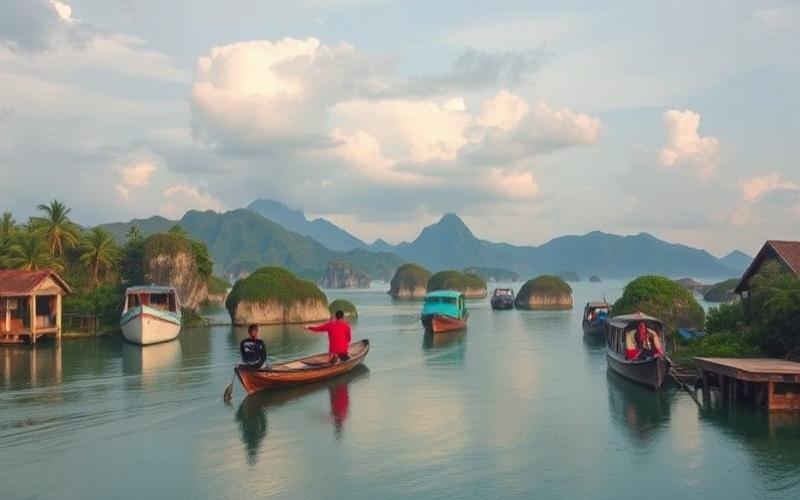
 Published on and written by Cyril Jarnias
Published on and written by Cyril Jarnias
Venturing into entrepreneurship abroad can be both a rewarding experience and a bold challenge, and Indonesia proves to be particularly fertile ground for innovative minds seeking to establish themselves beyond traditional borders.
This dynamic archipelago, with its sustained economic growth and unique cultural context, offers countless opportunities for ambitious expatriates. However, starting a business in Indonesia requires a refined understanding of local specifics, from administrative procedures to market subtleties.
This entrepreneurial guide aims to step-by-step accompany aspiring entrepreneurs through the intricacies of Indonesian legislation, providing practical advice to effectively navigate this fascinating economic landscape, while exploring the cultural particularities and networks that can make all the difference in realizing your project.
Choosing the Right Legal Structure in Indonesia
Types of Legal Structures Available for Foreign Entrepreneurs in Indonesia
| Legal Structure | Foreign Access | Liability | Minimum Capital | Permitted Activities | Duration/Validity |
|---|---|---|---|---|---|
| PT PMA (Perseroan Terbatas PMA) | Yes, often 100% | Limited to invested capital | Approx. 10 billion IDR (≈ €580,000) | Most commercial activities | Unlimited, as long as the company complies with the law |
| Representative Office | Yes | N/A (no commercial activity) | None | Prospecting, market research, liaison | Generally 2-3 years, renewable |
| CV (Commanditaire Vennootschap) | Limited | Unlimited (general partner) | None | Restricted sectors, small businesses | Unlimited |
| Local Company (PT local/LLC) | No (via local partner) | Limited to invested capital | Varies by sector | All sectors open to nationals | Unlimited |
Main Features and Legal Requirements
- PT PMA (Foreign Investment Limited Liability Company)
- Up to 100% foreign ownership (depending on business sector)
- High minimum share capital required
- Need for a business plan, registration with the Ministry of Law and Human Rights, obtaining business licenses, tax and social registration, appointment of directors and commissioners (often at least one Indonesian)
- Obligation to employ a certain number of local staff
- Representative Office
- Cannot engage in revenue-generating commercial activities
- Used for market research, establishing contacts, serving as a liaison agent
- Simplified registration, no minimum capital, limited and renewable duration
- CV (Commanditaire Vennootschap)
- Partnership between general partners (unlimited liability) and limited partners (limited liability)
- Simple and quick setup, no minimum capital
- Limited foreign ownership, often used by local entrepreneurs or foreigners via partnership
- Less suitable for obtaining work visas for foreigners
- Local Company (PT local/LLC)
- Reserved for nationals or via an Indonesian “nominee” (strongly discouraged due to legal risks)
- Setup procedure similar to PT PMA but without direct foreign access
Advantages and Disadvantages
| Structure | Advantages | Disadvantages |
|---|---|---|
| PT PMA | Access to most sectors, credibility, work visa possibility | Complex and costly process, high minimum capital, local obligations |
| Rep. Office | Simple procedure, no capital required, good for testing the market | Prohibition on invoicing or generating revenue, limited duration |
| CV | Quick setup, flexible, no minimum capital | Unlimited liability, restrictions for foreigners, low credibility |
| PT local/LLC | Quick procedure, access to all sectors open to Indonesians | Not directly accessible to foreigners, high legal risks |
Registration Process (PT PMA, example)
- Preparation of business plan and articles of association
- Submission of application to the Indonesian Investment Coordinating Board (BKPM)
- Registration with the Ministry of Law and Human Rights
- Opening bank account and depositing share capital
- Obtaining tax identification number (NPWP)
- Applying for business and sectoral licenses
- Registration with local and social authorities
- Average timeframe: 2 to 4 months
Rights and Responsibilities of Foreign Entrepreneurs
- Right to own and manage the business (PT PMA, under conditions)
- Liability limited to the amount of subscribed capital (except CV for general partners)
- Obligation of legal, tax, and social compliance
- Need to obtain work visas for expatriate managers or employees
- Respect for sectoral restrictions (some sectors remain closed or limited to foreigners)
Recommendations Based on Goals and Profiles
- Large-scale projects, open sectors, desire for sustainable establishment: prefer PT PMA for flexibility, credibility, and legal security
- Testing phase, prospecting or market research: choose a representative office to limit costs and commitments
- Small local activity, partnership with Indonesians: CV may be suitable, but beware of liability and restrictions on foreign ownership
- Entrepreneurs seeking to bypass restrictions: avoid “nominee” arrangements with a local PT, as they involve major legal risks
Key Takeaways:
The choice of structure depends on the business sector, project size, medium and long-term ambitions, and the desired level of control. It is strongly advised to consult a specialized local lawyer to secure the process and remain compliant with Indonesian legislation.
Good to Know:
Perseroan Terbatas (PT) is ideal for companies seeking to operate on a large scale in Indonesia, while a representative office is suitable for testing the market without commercial activities. Ensure compliance with local registration requirements and consider the tax implications of each structure before deciding.
Understanding Administrative Procedures and Tax Obligations
Permits for Foreigners
- Work permit (KITAS) and tax identification number (NPWP) mandatory for foreign shareholders.
- Prior approval from the Investment Coordinating Board (BKPM).
- Specialized consulting services and local agencies can assist with the administrative process.
Registration Process
- Choosing the appropriate legal structure.
- Reserving and validating the company name with the Ministry of Justice and Human Rights.
- Drafting and legalizing the deed of establishment by an Indonesian notary.
- Depositing the minimum capital into the company’s bank account.
- Registration with BKPM and obtaining sectoral licenses.
- Registration in the trade register and obtaining the NPWP.
- Notification to the Ministry of Manpower and social agencies.
Available Legal Structures and Benefits
| Legal Structure | Main Advantages |
|---|---|
| PT PMA (foreign capital company) | Access to local market, possibility of foreign investors |
| PT (local company) | Simplified procedures, reserved for Indonesians |
| Representative Office | Limited activities, quick setup |
Minimum Capital Requirements
- PT PMA: IDR 2.5 billion (approx. €150,000), part of which must be deposited initially.
Typical Processing Times
- Name reservation: 2 to 3 business days
- Legalization of deed of establishment: 2 to 4 weeks
- Obtaining NPWP: a few days
- BKPM investment license: 1 to 2 weeks
- Sectoral permits: variable timeframes depending on the sector
Main Required Documents
- Passports and personal information of founders and shareholders
- Description of business activity and sector codes
- Business address in Indonesia
- Capital breakdown and proof of deposit
- Deed of establishment legalized by a notary
- Lease agreement or proof of address ownership
- Profile descriptions of directors and shareholders
Tax Obligations in Indonesia
| Tax Type | Rate | Filing | Specifics |
|---|---|---|---|
| Corporate Tax | ~22–30% | Monthly/Annual | Based on profits earned |
| VAT (PPN) | 11% | Monthly | All eligible businesses |
| Social Contributions | Variable | Monthly | Employees and employers concerned |
Tax Filing: generally monthly for VAT, annual for corporate tax.
Companies must obtain a tax identification number (NPWP) and register with social agencies.
Resources and Practical Advice
Useful Government Agencies:
- BKPM (Indonesia Investment Coordinating Board): support for foreign investments.
- Ministry of Justice and Human Rights: registration of name and deed of establishment.
- Indonesian Tax Administration: obtaining NPWP and tax advice.
Tax Consulting Services and Specialized Firms: assistance with compliance, filing management, and regulatory monitoring.
Practical Tips for Navigating the Administrative System:
- Prepare all required documents in advance and verify their compliance.
- Engage a local agent or specialized firm to expedite procedures and limit errors.
- Monitor regulatory developments, especially those from BKPM.
- Keep records of all exchanges and official documents.
- Prioritize direct communication with agencies to reduce delays and obtain updated information.
Important:
For a successful establishment, it is recommended to surround yourself with reliable partners, regularly consult official resources, and plan procedures considering administrative timelines and sectoral requirements.
Good to Know:
To create a company in Indonesia, foreigners must obtain a professional KITAS and ensure their company is registered with BKPM; prioritize the services of a local consultant to navigate suitable legal forms, such as PMA, which requires a specific minimum share capital. Companies must file VAT monthly and fulfill quarterly tax obligations, with corporate tax rates set at 22%; seek assistance from public agencies like BPJS for advice on social contributions.
Finding Funding and Support Resources
Funding Options for Foreign Entrepreneurs in Indonesia:
- Foreign Direct Investments (FDI)
Indonesia encourages foreign investments through measures such as deregulation, tax incentives (special economic zones, tax reductions, etc.), and lowering the minimum capital requirement for foreign investors. Certain activities are partially or fully open to foreign ownership, under the auspices of BKPM (Investment Coordinating Board).
Examples of open sectors:- Construction: up to 67% (70% for ASEAN investors)
- Distribution: up to 67%, or 100% if affiliated with the manufacturer
- Insurance: up to 80%
- Bank Loans Specific to Expatriates
A few Indonesian banks offer loans to foreign entrepreneurs, although access remains difficult and conditional on strong guarantees or a local partnership. - Crowdfunding Platforms
Local platforms like Crowdo and Akseleran allow raising funds from the public while validating market interest in the project. This option is particularly suitable for innovative or high social impact projects. - Business Angels and Venture Capital
Networks like Bali Angels Network or East Ventures fund startups led by expatriates. Venture capital funds such as Kejora Ventures or Alpha JWC Ventures invest in companies with high growth potential. - Equity and Love Money
Using personal savings or support from relatives is often the first funding step for foreign entrepreneurs.
Indonesian Incubators and Accelerators:
| Structure | Type | Services Offered | Target Audience |
|---|---|---|---|
| Startup Bali | Incubator | Support, initial funding, access to investor network | Foreign and local entrepreneurs |
| Hubud | Accelerator | Mentoring, coworking spaces, connection with investors | Expatriates and digital nomads |
| 1000 Digital Startup Movement | Government Program | Grants, coaching, networking | Innovative projects, including expatriates |
Government Programs and Incentive Measures:
- Tax incentives for investments in special economic zones
- Reduced energy tariffs for labor-intensive industries
- Subsidies and support for innovative startups
- Removal of approval requirements for certain commercial transactions involving foreign investors
- Deregulation and simplification of administrative procedures
Mentor Networks and Support:
- Incubators and accelerators provide access to networks of mentors, experts, and local partners.
- Entrepreneurial events and forums allow meeting business angels, investors, and other entrepreneurs.
- Specialized firms offer personalized support in business creation and development.
List of Main Resources Available to Expatriate Entrepreneurs:
- Local crowdfunding platforms (Crowdo, Akseleran)
- Business angel networks (Bali Angels Network, East Ventures)
- Indonesian venture capital funds (Kejora Ventures, Alpha JWC Ventures)
- Incubators and accelerators (Startup Bali, Hubud)
- Government programs (1000 Digital Startup Movement, tax incentives)
- Support firms and establishment consultants
Key Takeaways:
The diversity of funding sources in Indonesia allows foreign entrepreneurs to combine several options based on the nature and stage of their project. Knowledge of regulatory specifics and integration into the local ecosystem are essential to maximize success chances.
Good to Know:
Expatriate entrepreneurs in Indonesia can benefit from specific programs like the Investor Relations Unit that facilitate foreign investments, and rely on crowdfunding platforms like KitaBisa, as well as local incubators such as Block71 Jakarta to obtain support and resources.
Integrating Cultural Differences into Business Practices
Understanding and respecting Indonesian cultural norms is an essential condition for successfully creating and developing a business in this country.
Local Business Practices and Importance of Gotong Royong
- The concept of Gotong Royong refers to community cooperation and mutual aid, fundamental values in Indonesian society and business.
- Personal relationships and networking take precedence over formal contracts: it is common to prioritize trust and interpersonal bonds before any major transaction.
- Negotiations and partnerships rely on creating a lasting climate of trust: it is necessary to invest time in informal meetings and preliminary discussions before addressing business topics.
Communication Styles and Dispute Management
- Indonesian communication is generally indirect, aiming to preserve harmony and avoid direct confrontations.
- Criticisms or disagreements are formulated subtly or through intermediaries; it is crucial to pay attention to unspoken words and body language.
- Use polite language, employ appropriate titles (Bapak/Ibu), and avoid any form of public humiliation or frontal confrontation.
| Cultural Element | Recommended Practice for Expatriate Entrepreneurs |
|---|---|
| Gotong Royong (mutual aid) | Participate in networking events, value collaboration |
| Indirect Communication | Prioritize diplomacy, read nonverbal signals |
| Respect for Hierarchy | Address senior executives first, follow decision-making chain |
| Harmony and Non-Confrontation | Avoid public criticism, seek consensus |
Integrating Cultural Values into Management
- Respect for hierarchy is central: decisions are often made at the top, and deference to superiors should be shown.
- Social harmony should guide all professional interactions: prioritize listening, patience, and private conflict management.
- Inclusion and diversity are increasingly valued, especially in modern and international sectors.
Practical Tips for Expatriate Entrepreneurs
- Take time to build personal relationships before discussing business.
- Adapt management style considering respect for hierarchy and the need to preserve collective harmony.
- Participate in local events, integrate Indonesian collaborators into the management team, and remain open to cultural flexibility (especially regarding the concept of time).
- Learn about local rituals, customs, and holidays to show respect and strengthen integration.
- Be attentive to regional diversity: practices may vary by island and ethnic groups.
Immersing oneself in Indonesian values, prioritizing indirect dialogue, and investing in creating authentic relationships are the keys to lasting success in the Indonesian entrepreneurial ecosystem.
Good to Know:
Respecting Indonesian cultural norms is crucial for success: value Gotong Royong by investing in personal relationships to facilitate negotiations and partnerships. Prioritize indirect communication to maintain harmony and respect hierarchy, essential elements to integrate into your management strategies.
Disclaimer: The information provided on this website is for informational purposes only and does not constitute financial, legal, or professional advice. We encourage you to consult qualified experts before making any investment, real estate, or expatriation decisions. Although we strive to maintain up-to-date and accurate information, we do not guarantee the completeness, accuracy, or timeliness of the proposed content. As investment and expatriation involve risks, we disclaim any liability for potential losses or damages arising from the use of this site. Your use of this site confirms your acceptance of these terms and your understanding of the associated risks.






















